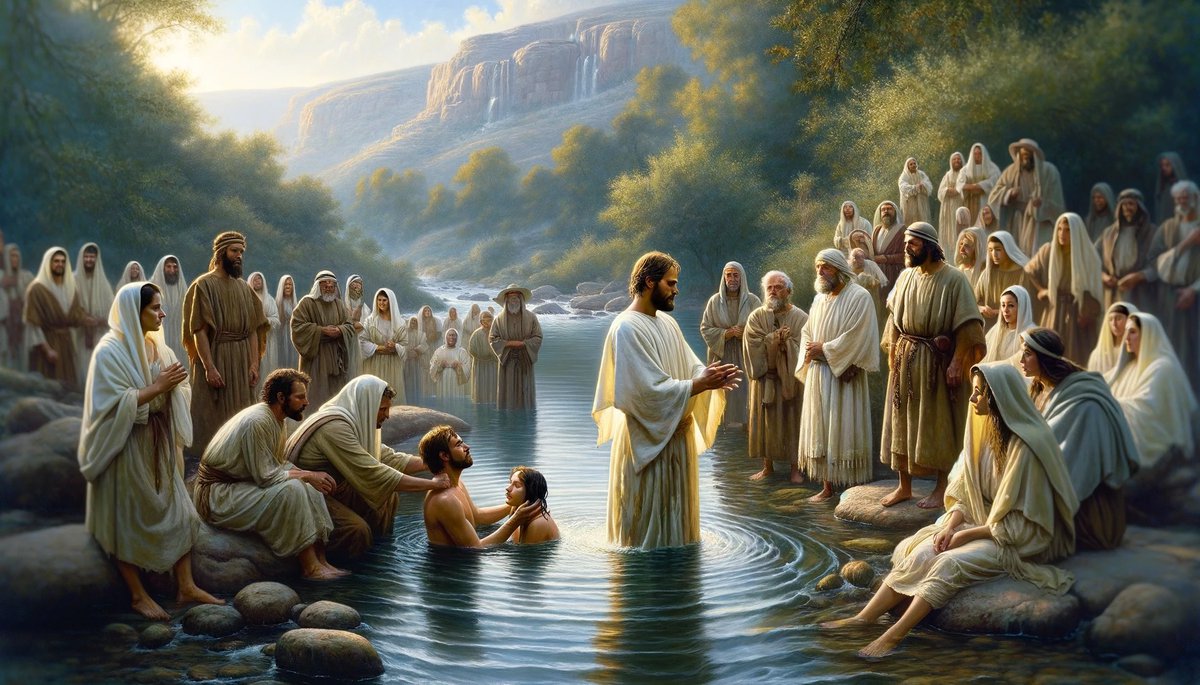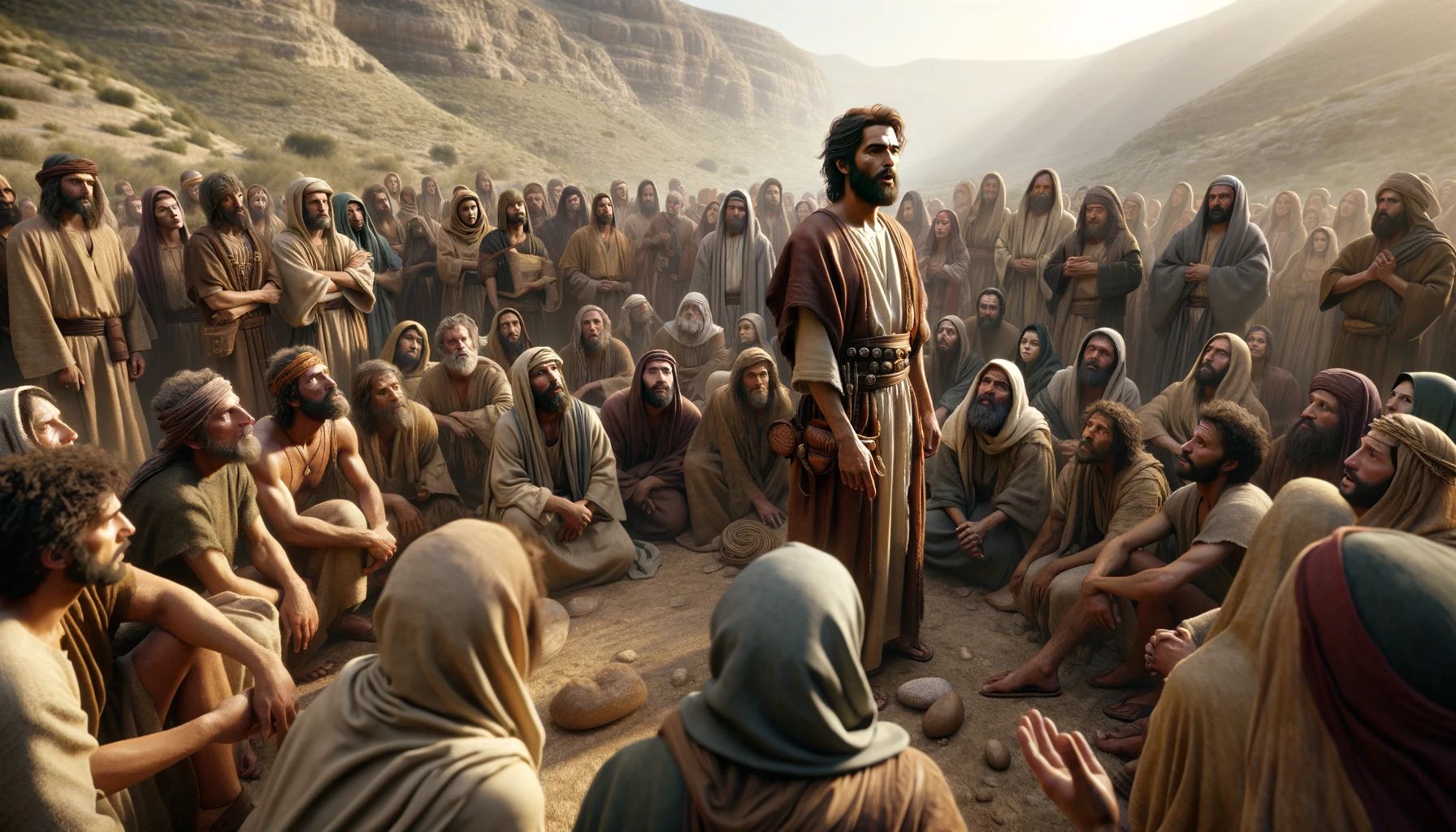Home>Theology and Spirituality>Why Am I Baptist


Theology and Spirituality
Why Am I Baptist
Published: February 22, 2024
Peter Smith, Editorial Director at Christian.net, combines deep insights into faith, politics, and culture to lead content creation that resonates widely. Awarded for his contributions to religious discourse, he previously headed a major organization for religious communicators, enhancing dialogue on faith's societal impacts.
Discover the core beliefs and practices of Baptist theology and spirituality. Explore the rich history and foundational principles of the Baptist faith.
(Many of the links in this article redirect to a specific reviewed product. Your purchase of these products through affiliate links helps to generate commission for Christian.net, at no extra cost. Learn more)
Table of Contents
Introduction
Baptist faith is a vibrant and diverse Christian tradition that has deeply influenced the spiritual landscape for centuries. Rooted in a rich history and guided by a set of core beliefs and practices, the Baptist community has made a profound impact on individuals and societies around the world. Whether you are a lifelong Baptist, exploring different faith traditions, or simply curious about the Baptist denomination, understanding the essence of Baptist beliefs and practices can provide valuable insights into this influential Christian movement.
As we delve into the historical background, core beliefs, and traditions of the Baptist faith, it becomes evident that the Baptist community is characterized by its commitment to individual freedom, congregational autonomy, and the authority of Scripture. These foundational principles have shaped the identity of Baptist churches and have contributed to their enduring significance within the broader tapestry of Christianity.
In this article, we will embark on a journey to explore the multifaceted nature of Baptist faith, shedding light on its historical evolution, doctrinal distinctiveness, and the lived experiences of those who identify with this tradition. By gaining a deeper understanding of what it means to be Baptist, we can appreciate the profound impact of this faith on the lives of its adherents and the wider world.
Join me as we unravel the captivating story of Baptist faith, uncover its core tenets, and gain insights into the practices and traditions that have sustained this dynamic Christian community. Whether you are seeking to enrich your knowledge of different faith traditions or simply intrigued by the Baptist denomination, this exploration promises to offer a compelling and enlightening journey into the heart of Baptist identity.
Read more: Why I Am A Baptist Clarence Larkin
Historical Background of Baptist
The historical roots of the Baptist tradition can be traced back to the early 17th century, amidst the backdrop of the Protestant Reformation and the fervent quest for religious freedom. The emergence of the Baptist movement was deeply intertwined with the social, political, and religious upheavals of the time, as individuals sought to redefine their relationship with faith and authority.
One of the defining moments in Baptist history is linked to the English Separatist movement, where dissenting believers, disillusioned with the established Church of England, sought to form independent congregations based on their interpretation of Scripture. This quest for autonomy and a return to New Testament principles laid the groundwork for the development of Baptist identity.
In 1609, in Amsterdam, a pivotal figure named John Smyth, along with a group of like-minded believers, performed believer's baptism by immersion, marking a significant departure from the prevailing practice of infant baptism. This act symbolized a profound commitment to personal faith and a rejection of state-mandated religious practices, setting the stage for the distinctiveness of the Baptist movement.
The early Baptists, influenced by the Anabaptist tradition and inspired by the teachings of the New Testament, emphasized the priesthood of all believers and the autonomy of the local church. This emphasis on individual conscience, congregational governance, and the separation of church and state became hallmarks of Baptist identity, reflecting a deep-seated commitment to religious liberty and the authority of Scripture.
As the Baptist movement spread across Europe and later to the American colonies, it underwent various theological and practical developments, giving rise to diverse Baptist denominations and affiliations. The Baptist faith journeyed through periods of persecution, expansion, and theological reflection, leaving an indelible mark on the tapestry of Christian history.
Today, the Baptist tradition encompasses a global community of believers, each contributing to the ongoing narrative of Baptist identity. The historical trajectory of the Baptist movement reflects a steadfast dedication to the principles of soul freedom, believer's baptism, and the autonomy of the local church, shaping the ethos of Baptist faith and practice for generations to come.
Core Beliefs of Baptist
At the heart of the Baptist faith lie a set of core beliefs that have shaped its identity and theological framework. These foundational principles serve as guiding lights for Baptist communities around the world, informing their understanding of God, humanity, and the Christian journey. Let's delve into the essential tenets that underpin the Baptist tradition.
Soul Freedom and Individual Autonomy
Central to Baptist belief is the concept of soul freedom, which asserts the inherent liberty of individuals to discern matters of faith and conscience without external coercion or imposition. This principle underscores the profound value placed on personal autonomy in matters of belief, reflecting a deep respect for the individual's capacity to engage with God and interpret Scripture according to their conscience.
Believer's Baptism by Immersion
Believer's baptism stands as a defining practice and belief within the Baptist tradition. This act symbolizes a public declaration of faith and a personal commitment to Christ, typically administered through immersion in water. The emphasis on believer's baptism underscores the conviction that faith is a personal choice and that baptism is reserved for those who have consciously embraced the Christian faith.
Read more: Who Am I | Christian Songs For Kids
Priesthood of All Believers
Baptists affirm the priesthood of all believers, recognizing that every individual has direct access to God and the responsibility to engage in the life of the church. This egalitarian principle rejects hierarchical structures that separate clergy and laity, emphasizing the shared priesthood of all believers and their equal standing before God.
Authority of Scripture
The Baptist tradition upholds the authority of Scripture as the primary source of divine revelation and guidance for faith and practice. This commitment to the Bible as the inspired and authoritative Word of God underscores the centrality of Scripture in shaping beliefs, ethics, and the mission of the church.
Congregational Autonomy
Baptists adhere to the principle of congregational autonomy, affirming the independence of local churches in matters of governance, doctrine, and mission. This decentralized approach to church governance empowers congregations to make decisions collectively, reflecting a commitment to local self-governance and the freedom to discern God's leading within their specific contexts.
Separation of Church and State
The Baptist tradition champions the separation of church and state, advocating for religious freedom and the avoidance of state interference in matters of faith. This principle reflects a commitment to the independence of the church from political control and the protection of religious liberty for all individuals.
These core beliefs form the bedrock of Baptist identity, shaping the theological outlook, ecclesial practices, and ethical commitments of Baptist communities worldwide. Embracing these foundational principles, Baptists continue to navigate the complexities of contemporary society while remaining rooted in their enduring convictions.
Baptist Practices and Traditions
Baptist practices and traditions are deeply intertwined with the core beliefs that define the Baptist faith. These distinctive practices reflect the lived expressions of Baptist identity and serve as integral components of worship, community life, and ethical engagement. From the celebration of believer's baptism to the communal ethos of congregational life, Baptist practices and traditions encapsulate the dynamic tapestry of faith in action.
Believer's Baptism by Immersion
Believer's baptism stands as a central practice within the Baptist tradition, symbolizing the public profession of faith and the individual's commitment to Christ. The act of immersion in water represents a profound spiritual journey, signifying the believer's identification with the death, burial, and resurrection of Jesus Christ. This symbolic immersion underscores the transformative nature of faith and the believer's participation in the redemptive narrative of Christianity.
Congregational Worship and Community Life
Baptist congregations place a strong emphasis on vibrant worship experiences that encompass prayer, singing, preaching, and the celebration of the Lord's Supper. These communal gatherings serve as focal points for spiritual nourishment, mutual encouragement, and the expression of shared faith. The participatory nature of Baptist worship reflects the priesthood of all believers, inviting active engagement from the entire congregation in the expression of their devotion and commitment to God.
Emphasis on Discipleship and Mission
Baptist communities are characterized by a fervent commitment to discipleship and mission, seeking to embody the teachings of Jesus Christ in their daily lives and outreach efforts. The call to make disciples and engage in compassionate service lies at the heart of Baptist identity, inspiring individuals and congregations to extend the love of Christ to their local communities and beyond. This outward focus on mission reflects the Baptist conviction that faith is inseparable from acts of compassion, justice, and transformative engagement with the world.
Read more: What Should I Wear To A Baptist Church
Commitment to Religious Liberty and Social Justice
Baptists have historically been champions of religious liberty and advocates for social justice, standing against oppression and advocating for the rights of all individuals. This commitment to freedom of conscience and the pursuit of justice aligns with the Baptist belief in the dignity of every person and the responsibility to address systemic inequities. Whether through grassroots activism, humanitarian initiatives, or advocacy for marginalized communities, Baptist traditions embody a commitment to upholding the principles of justice and compassion in society.
Ecclesial Autonomy and Collaborative Networks
The Baptist tradition values the autonomy of local congregations while also fostering collaborative networks and associations for mutual support and shared mission. This balance between congregational independence and cooperative endeavors reflects the Baptist commitment to unity amidst diversity, allowing for the exchange of resources, insights, and collective efforts in advancing the kingdom of God. These collaborative networks serve as catalysts for collective impact, enabling Baptist communities to address complex challenges and extend their influence for the greater good.
In essence, Baptist practices and traditions encapsulate the vibrant expressions of faith, community, and mission that define the Baptist identity. Grounded in the core beliefs of the tradition, these practices serve as pillars of spiritual vitality, ethical engagement, and communal solidarity, shaping the lived experiences of Baptist communities across the globe.
Personal Experience with Baptist Faith
My personal journey with the Baptist faith has been a profound odyssey marked by spiritual discovery, communal fellowship, and a deep sense of purpose. Growing up in a Baptist community, I was immersed in a rich tapestry of faith experiences that shaped my understanding of God, humanity, and the transformative power of Christian community.
From my earliest memories, the vibrant worship gatherings, fervent prayers, and heartfelt hymns became integral aspects of my spiritual formation. The emphasis on believer's baptism by immersion stood as a pivotal moment in my own faith journey, symbolizing a personal commitment to follow Christ and a public declaration of my identity as a member of the faith community.
The ethos of congregational autonomy and the priesthood of all believers instilled in me a profound sense of responsibility and belonging within the church. I witnessed firsthand the collaborative spirit of Baptist congregations, where individuals from diverse backgrounds came together to worship, serve, and support one another in times of joy and adversity.
The commitment to mission and social justice within the Baptist tradition deeply resonated with my own convictions, inspiring me to engage in outreach initiatives and advocacy efforts aimed at addressing societal challenges and extending compassion to those in need. The Baptist community became a catalyst for my personal growth, nurturing a deep sense of empathy, resilience, and a passion for making a positive impact in the world.
Through the years, I have been privileged to witness the transformative power of the Baptist faith in the lives of individuals and communities. The unwavering commitment to religious liberty, the pursuit of justice, and the call to embody the love of Christ in tangible ways has left an indelible mark on my own understanding of faith and discipleship.
In moments of doubt and uncertainty, the supportive network of fellow believers within the Baptist community provided a source of strength, encouragement, and shared purpose. The communal ethos of Baptist traditions has fostered enduring relationships, mentorship, and a deep sense of belonging that continues to shape my spiritual journey.
My personal experience with the Baptist faith has been a testament to the enduring impact of core beliefs, vibrant practices, and the transformative power of Christian community. It has instilled in me a profound appreciation for the diverse tapestry of faith expressions and the unyielding hope that emerges from a life rooted in the love of God and the shared journey of faith with fellow believers.
This personal encounter with the Baptist faith has not only enriched my spiritual life but has also ignited a passion to share the profound blessings of this tradition with others, inviting them to embark on their own transformative odyssey of faith, community, and purpose.
Conclusion
In conclusion, the Baptist faith stands as a testament to the enduring impact of historical legacy, core beliefs, vibrant practices, and the transformative power of Christian community. From its humble origins amidst the fervent quest for religious freedom to its global presence today, the Baptist tradition has left an indelible mark on the tapestry of Christian history and continues to shape the lives of individuals and communities around the world.
The historical background of the Baptist movement reflects a journey marked by resilience, theological reflection, and a steadfast commitment to the principles of individual freedom, believer's baptism, and congregational autonomy. These foundational pillars have not only defined the identity of Baptist churches but have also contributed to the broader narrative of religious liberty and the pursuit of a personal relationship with God.
The core beliefs of the Baptist tradition, including soul freedom, believer's baptism by immersion, the priesthood of all believers, the authority of Scripture, congregational autonomy, and the separation of church and state, serve as guiding lights that illuminate the path of faith for Baptist communities. These beliefs underscore the profound value placed on personal autonomy, the transformative nature of baptism, the egalitarian priesthood of all believers, and the enduring authority of Scripture in shaping the ethos of Baptist identity.
Baptist practices and traditions, from the celebration of believer's baptism to the fervent commitment to mission and social justice, embody the lived expressions of faith, community, and ethical engagement that define the Baptist identity. These practices serve as pillars of spiritual vitality, communal solidarity, and the pursuit of justice, reflecting the enduring impact of Baptist convictions in the contemporary landscape of faith and society.
My personal experience with the Baptist faith has been a testament to the transformative power of core beliefs, vibrant practices, and the communal ethos of Christian community. It has instilled in me a profound appreciation for the diverse tapestry of faith expressions and the unyielding hope that emerges from a life rooted in the love of God and the shared journey of faith with fellow believers.
In essence, the Baptist tradition continues to inspire individuals to embark on a transformative odyssey of faith, community, and purpose, inviting them to embrace the enduring legacy of historical resilience, theological distinctiveness, and the unwavering commitment to the principles that have shaped the Baptist identity for centuries.












